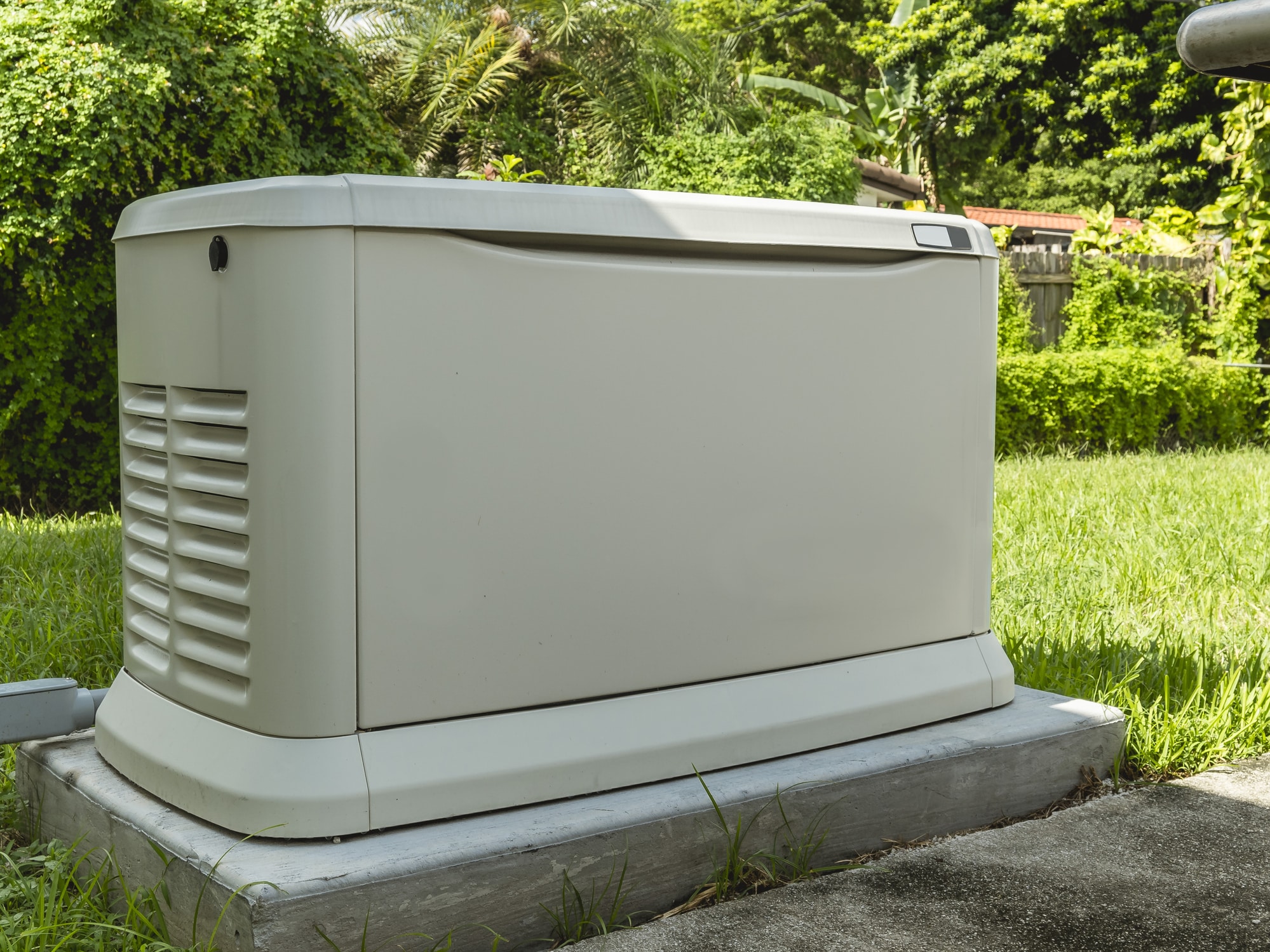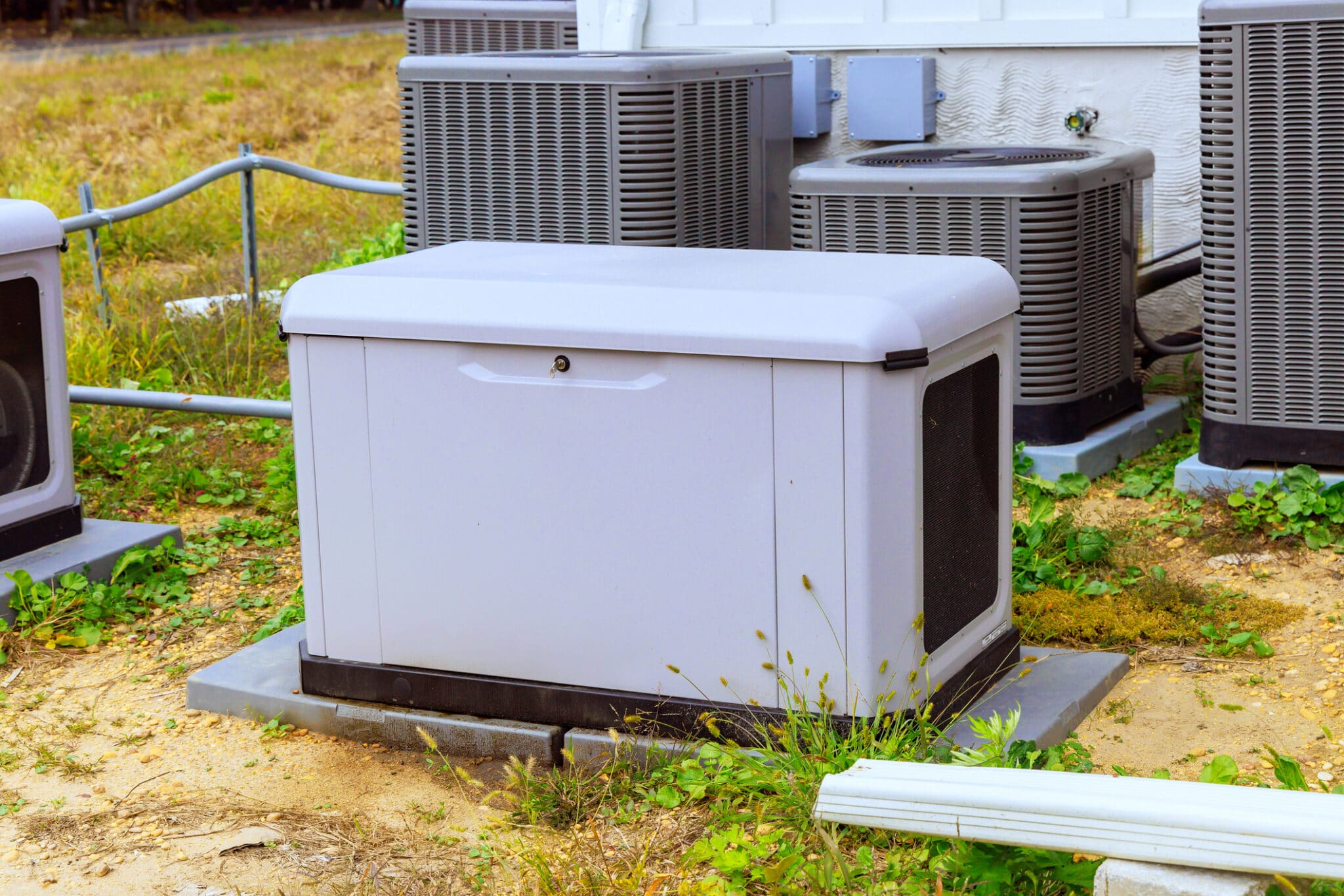Standby Generators – Imagine being in the middle of a winter storm, and suddenly, the power goes out. The heat stops, the lights go dark, and all those essential devices are down for the count. Standby generators can be the ultimate lifesaver, keeping your home warm, safe, and functional when the weather takes a turn for the worse.
In places like Charleston, Mt. Pleasant, and Summerville, winter storms can disrupt power unexpectedly, making a backup generator a must-have for peace of mind and protection. Let’s explore how standby generators enhance winter safety!
What Are Standby Generators?
A standby generator is a permanently installed backup power source that automatically activates when your home experiences a power outage.
Unlike portable generators, which require manual setup and frequent refueling, standby generators connect directly to your home’s electrical system and use a continuous fuel source, like natural gas or propane.
Once installed, these systems monitor your home’s power and spring into action the moment they detect a loss, ensuring that your heating, lighting, and other critical appliances continue to function without interruption.

Why Winter Requires Extra Safety Measures
Winter brings unique challenges that make homes more vulnerable to unexpected issues, especially during severe weather. Snowstorms, icy roads, and freezing temperatures can disrupt daily life, making reliable power essential for maintaining warmth and safety.
When power outages strike in winter, the consequences are more than inconvenient; without power, heating systems fail, indoor temperatures drop, and frozen pipes become a real risk. In areas like Charleston, Mt. Pleasant, and Summerville, where even a rare winter storm can lead to prolonged outages, standby generators provide a reliable solution.
These generators keep the heat on, preserve food supplies, and ensure that communication devices remain operational, making them essential for winter preparedness.
How Standby Generators Improve Winter Safety
Ensuring a Reliable Power Supply
Standby generators offer a dependable power source when winter weather knocks out the main grid. Designed to kick in automatically, it keeps your home powered without any delay, so you’re never left scrambling in the dark.
This continuous power is crucial for maintaining essential systems like heating, lighting, and communication, which are especially important during a storm. For families in regions like Charleston, Mt. Pleasant, and Summerville, this reliability is invaluable in staying comfortable and safe, no matter how severe the weather outside.
With standby generators, you gain a reliable safety net that protects your home through even the most challenging winter conditions.
Protecting Your Home’s Heating System
One of the most important functions of standby generators in winter is keeping your home’s heating system running smoothly. When temperatures drop and power is lost, indoor temperatures can quickly become unsafe, leading to discomfort and even health risks for those living in the home.
Standby generators are capable of powering your entire heating system, from the furnace to any electric heaters you may have, ensuring that your home stays warm and livable. This is particularly essential in homes where vulnerable family members, like the elderly or young children, need consistent warmth.
Powering Critical Appliances and Medical Devices
In winter, certain appliances and devices become even more essential, and standby generators ensure that they stay operational. Standby generators can power critical appliances like refrigerators, freezers, and cooking devices, which helps preserve food during an extended outage.
For households relying on medical devices, such as oxygen machines or mobility aids that require charging, having a continuous power source is vital for health and safety. This becomes even more significant during winter, when emergency services may face delays due to snowy or icy roads..
Enhancing Safety and Security During Power Outages
Power outages often compromise a home’s security, especially if the outage occurs at night when visibility is low. Standby generators not only keep your lights on but also power home security systems, ensuring that motion detectors, alarms, and surveillance cameras remain active.
This added layer of protection is important during a storm, when visibility is limited, and potential hazards are harder to spot. Additionally, keeping your outdoor lighting on during a winter storm improves safety by illuminating paths and driveways, reducing the risk of accidents on icy surfaces.
Key Benefits of Standby Generators in Winter
Peace of Mind for Homeowners
Owning standby generators provides an incredible sense of security during winter months. When a storm hits and the power goes out, knowing that your home will stay warm, lit, and functional removes a lot of stress from the situation.
This peace of mind is especially valuable for those living in places like Charleston, Mt. Pleasant, and Summerville, where winter weather can be unpredictable.
Instead of worrying about rushing to find a backup power source or braving icy roads to seek shelter, homeowners can feel safe and prepared. With standby generators in place, you have one less thing to worry about, allowing you to focus on keeping your family comfortable.
Financial Savings by Preventing Damage
Standby generators can help you avoid costly repairs that often follow winter power outages. For example, without heat, pipes can freeze and burst, causing water damage that requires extensive repair work.
A reliable power backup keeps your heating system running, reducing the risk of frozen pipes and the resulting damage to floors, walls, and insulation.
Additionally, maintaining power in your refrigerator and freezer protects your food supply, saving you the expense of replacing spoiled groceries. Over time, the upfront investment in a generator can actually save money by preventing these unexpected expenses.
Increased Home Value
Installing a standby generator can also boost your home’s value, making it an attractive feature for potential buyers. Homeowners appreciate knowing that their property has built-in backup power, which can be a significant selling point, especially in areas prone to severe weather.
A standby generator signals that a home is prepared for emergencies, and buyers often see this as a sign of quality and care. If you ever decide to sell your home, this addition can make it stand out in the market and may even lead to a higher sale price.
Fuel Efficiency
Standby generators are designed with fuel efficiency in mind, using resources like natural gas or propane to power your home without constant refueling. This efficiency ensures that the generator can run for extended periods without interruption, which is particularly important during long winter outages.
Unlike portable generators, which need frequent refills and can run out of fuel quickly, standby generators offer a stable, long-term solution for energy needs.
In winter, when access to fuel can be limited due to road conditions or supply shortages, a standby generator’s fuel-efficient design becomes even more valuable, helping you stay powered up without the hassle.
Automatic Power Restoration
One of the greatest benefits of a standby generator is its ability to restore power automatically without any manual intervention. When a power outage occurs, the generator detects the interruption and begins supplying power to your home within seconds.
This automatic response is particularly helpful during winter storms, where safety may depend on having uninterrupted heating and lighting. You don’t have to worry about going outside in severe weather to set up a generator or connect power cords.
With automatic power restoration, you can stay safe and comfortable indoors, knowing the generator will handle the transition seamlessly.
Protection of Home Technology and Appliances
Winter power outages can result in sudden voltage drops and spikes that may damage electronics and appliances. Standby generators offer protection by delivering a stable power flow to sensitive devices like computers, TVs, and even smart thermostats, which can all be vulnerable during a power loss.
By keeping a steady power supply, standby generators reduce the risk of electrical damage to valuable home technology. This protection is particularly beneficial for homeowners who work from home or rely on internet-based devices, ensuring essential equipment stays safe and functional throughout the winter.
Choosing the Right Standby Generator for Winter
Factors to Consider (Size, Fuel Type, etc.)
Choosing the right standby generator for winter requires careful consideration of factors like size, fuel type, and power needs. Here’s a breakdown of what to look at when selecting a generator that suits your home and ensures warmth and safety during colder months:
- Size and Power Capacity: Select a model based on your home’s power demand. Larger homes with multiple essential systems, like heating and refrigeration, typically need a higher-capacity generator to ensure everything runs smoothly.
- Fuel Type: Most generators use natural gas or propane. Natural gas is convenient when connected directly to your home, while propane offers easy storage, ideal for areas with frequent outages.
- Power Requirements for Essentials: Identify essential appliances or systems—such as heating, lighting, and refrigeration—to ensure the generator can handle the necessary load without being overwhelmed.
- Additional Features: Consider features like automatic start and weather-resistant enclosures, especially in winter-prone areas.
Investing in the right standby generator brings peace of mind and ensures your home stays functional and comfortable even when winter storms knock out the power.
Consulting Professionals for Installation
Installing a standby generator is not a do-it-yourself project. It requires a professional who understands electrical connections, fuel lines, and local regulations.
Professional installation not only ensures that your generator is set up correctly but also provides peace of mind knowing it will work safely and effectively.
In areas like Charleston, Mt. Pleasant, and Summerville, consulting a local expert is especially beneficial, as they’re familiar with the climate and can recommend the best placement for maximum efficiency.
Regular Maintenance Tips for Winter Preparedness
Keeping your standby generator in top condition is essential for ensuring it’s ready to handle any winter power outage.
Regular maintenance goes a long way in maximizing its performance and preventing unexpected issues, especially when cold weather is at its worst. Before winter kicks into high gear, taking time to inspect and maintain your generator can make all the difference.
- Check oil and fuel levels regularly to ensure the generator has sufficient fuel and can run smoothly for extended periods if needed during prolonged outages.
- Inspect and replace filters as necessary to keep them clean and functional, which ensures efficient operation and helps avoid unnecessary strain on the engine.
- Run a test cycle every month or as recommended by the manufacturer to keep the generator in top shape and ready to activate immediately when a power loss occurs.
- Schedule a full maintenance check with a professional at least once a year, ideally in the fall, to identify and address any potential issues before winter storms hit.
- Clear any debris around the unit and ensure that the exhaust vent is unobstructed, especially after heavy snowfall, to prevent carbon monoxide buildup and allow safe operation.
Staying on top of these simple but important maintenance tasks keeps your generator reliable and ready for any situation. With regular care, your standby generator will be a dependable safeguard for your home through the entire winter season.
Standby Generator Safety Tips for Winter
Ventilation and Carbon Monoxide Safety
Safety is key when using a standby generator, and one of the most important considerations is proper ventilation. Generators emit carbon monoxide, a colorless and odorless gas that can be dangerous if it accumulates.
Make sure the generator is installed outside, in a well-ventilated area, with plenty of space around it to allow exhaust gases to disperse. Avoid placing it near windows, doors, or vents where fumes could enter the home.
Regularly check that the exhaust system is clear, especially after heavy snowfall or ice buildup, to keep your home safe from carbon monoxide risks.
Routine Inspections Before Winter Storms
Conducting regular inspections of your standby generator, especially before major winter storms, ensures that everything is in working order when you need it most. Check for any signs of wear or loose connections, and make sure the generator’s battery is charged and ready to go.
Look over the fuel lines, oil levels, and coolant levels to catch any potential issues before they disrupt your power supply. Running a short test cycle once a month, or as recommended by the manufacturer, keeps the generator prepared and ready to activate automatically during an outage.
This simple routine can prevent unexpected breakdowns and give you confidence that your generator will work reliably throughout the winter season.
Keeping a Clear Path to the Generator
In winter, it’s essential to maintain easy access to your generator by clearing snow, ice, or debris from around the unit. Keeping a clear path allows for safe inspections and ensures that the generator’s ventilation system remains unobstructed.
After a heavy snowfall or ice storm, check the area around the generator to make sure nothing is blocking the exhaust vents or cooling systems. This not only helps the generator run efficiently but also protects it from potential damage caused by freezing temperatures or moisture buildup.
A little upkeep goes a long way in ensuring your generator operates smoothly and safely during a power outage.
Stay Safe and Powered This Winter with Mister Sparky of Charleston!
Don’t wait until the next winter storm hits to secure reliable backup power. At Mister Sparky of Charleston, we specialize in installing and maintaining standby generators that keep homes in Charleston, Mt. Pleasant, and Summerville warm, bright, and safe during power outages.
Our experts are ready to help you find the perfect generator to meet your needs—contact us today to stay prepared for whatever winter brings!

Frequently Asked Questions (FAQ)
How long can a standby generator run continuously in winter?
Standby generators are designed to run for extended periods, often capable of operating continuously for several days as long as they have a steady fuel supply. However, it’s essential to follow the manufacturer’s recommendations for safe and efficient use, and to occasionally allow the generator to rest if possible.
Do standby generators need a special type of fuel for winter?
Most standby generators run on natural gas or propane, which generally perform well in winter conditions. However, it’s a good idea to check with your generator manufacturer to confirm that the fuel type used will be efficient in colder temperatures, especially if you live in an area with extreme cold.
How often should I test my standby generator in winter?
To ensure reliability, test your standby generator monthly, even if no storms are expected. This involves running it for a few minutes to make sure all systems are functioning. Regular testing is especially helpful during winter when the risk of outages is higher.
Can a standby generator power my entire home during an outage?
Yes, many standby generators are capable of powering an entire home, depending on their size and the household’s power demands. Larger units can handle heating, lighting, and essential appliances simultaneously, though it’s important to select a generator that matches your home’s power needs.
What maintenance steps should I follow after a winter storm?
After a storm, clear any snow or ice from around the generator to prevent obstructions. Inspect the unit for any damage, check the fuel levels, and confirm that the ventilation system is clear. Running a quick test cycle can also help ensure that the generator is ready for the next potential outage.









